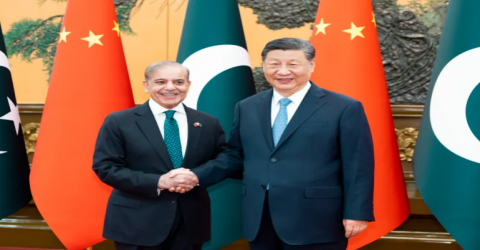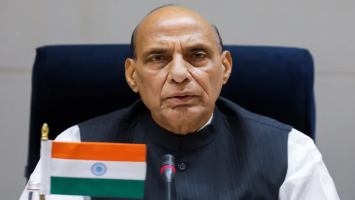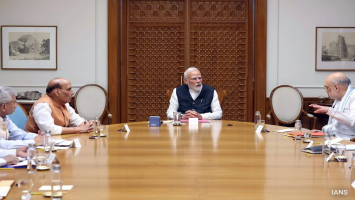‘Pakistan has responded’: Minister says Indian attacks killed 8, injured 30
Ramification of major armed conflict between Pakistan, India ‘devastating for both countries’
Kamal Hyder, Reporting from Islamabad, Pakistan
There is a risk of further escalation because, with the India-Pakistan equation, there is always a tit-for-tat.
Pakistan had said that it would respond forcefully.
Pakistan had also said that any attempt by India to divert the waters of the major rivers that are on the western side of the Indus River chain – and that includes the Chenab – that any river being diverted or water being cut off would be construed as an act of war.
The Indians have already resorted to that. We have reports that at least one major river, the Chenab, the Indians are holding water back and say that they will not release that water.
So that is a dangerous escalation because this is an existential threat. Pakistan is an agricultural country. It relies heavily on agriculture for its revenue and food security and Pakistani politicians, of course, have been saying that if the Indians stop those rivers, then those rivers will flow with blood.
So, at least at this moment, there should be caution by both sides. These are nuclear-armed states.
The ramifications of any major conflict between the two would be devastating for both countries.
Pakistan’s PM condemns ‘cowardly attack’ on X
Pakistan’s prime minister is back on X condemning India’s “cowardly” and “unprovoked” attack.
“Pakistan reserves the absolute right to respond decisively to this unprovoked Indian attack — a resolute response is already under way,” Sharif wrote, according to a translation.
“The entire nation stands united behind its armed forces, and our morale and resolve remain unshaken,” he added.
Three civilians killed by Pakistani artillery fire, Indian army says
India’s army says three civilians were killed overnight by Pakistani artillery fire.
The Pakistani army “resorted to arbitrary firing” across the Line of Control, the de facto border dividing Kashmir, the army said in a statement.
“Three innocent civilians lost their lives in indiscriminate firing/shelling”, the army said, adding that Indian forces were “responding in proportionate manner”.
Pakistan accuses India of ‘unprovoked and blatant act of war’
Pakistan’s Ministry of Foreign Affairs has released a strongly worded statement accusing India of carrying out an “unprovoked and blatant act of war”.
“India’s act of aggression has resulted in martyrdom of civilians, including women and children,” the statement says.
“This act of aggression has also caused grave threat to commercial air traffic. We strongly condemn India’s cowardly action, which is a flagrant violation of the UN Charter, international law, and established norms of inter-state relations.”
The ministry’s statement also accuses India of using the “bogey of terrorism to advance its sham narrative of victimhood, jeopardising regional peace and security”.
“India’s reckless action has brought the two nuclear-armed states closer to a major conflict,” it says.
“The situation continues to evolve. Pakistan reserves the right to respond appropriately at a time and place of its choosing, in accordance with the Article-51 of the UN Charter, and as enshrined in international law. The government, armed forces and people of Pakistan stand united in the face of Indian aggression. They will always act with iron resolve to protect and preserve the sovereignty and territorial integrity of Pakistan.”
US Senator calls for restraint, diplomacy
US Democratic Senator Jeanne Shaheen, a top member of the Senate Foreign Relations Committee, says she is “gravely concerned” by the “military escalation between India and Pakistan.”
“I implore the two governments to exercise restraint and prioritise diplomatic engagement,” she said.
The latest developments follow “the senseless terrorist attacks targeting innocent Indian civilians on April 22,” Shaheen added, calling for the perpetrators of those “heinous” attacks to be “brought to justice as soon as possible.”
India rebuts Pakistani claims via ‘fact check’ account
India’s Press Information Bureau (PIB) is using its dedicated “fact check” account on X to dispute Pakistani reports of the ongoing military exchanges between the sides.
Social media posts claiming that Pakistan destroyed an Indian Army brigade headquarters are false, the PIB Fact Check account claims. Reports of the destruction of the Indian brigade headquarters have been reported by Pakistani media.
Al Jazeera was not able to independently confirm or debunk either of the claims.
IBTN was not able to independently confirm or debunk either of the claims.
India army says 3 injured in cross-border shelling between India, Pakistan
The situation has “sharply escalated between Indian and Pakistan” forces, with both sides exchanging heavy fire along the Line of Control that separates Pakistan-administered Kashmir from Indian-administered Kashmir, journalist Umar Meraj told Al Jazeera.
Speaking from Indian-administered Kashmir, Meraj said that three people had been injured by the shelling, according to the Indian army, and an unidentified aircraft came down on a school building in the region.
“It is unclear if the aircraft crash landed and (if) the military and the security forces sealed off the area. Residents say that at like 2:30am in the night, they heard a loud blast, (and) after, they saw fire in the sky,” Meraj said.
He added that there has been no official word in India about claims by Pakistani officials that several Indian warplanes were brought down in the overnight clashes.
US’s Rubio spoke with Indian, Pakistani security officials, State Department says
US Secretary of State Marco Rubio has spoken with the national security advisers of India and Pakistan, urging the two sides to “keep lines of communication open and avoid escalation”, the US State Department has said.
The statement made on X comes after Rubio earlier said he was monitoring the situation closely and engaging with both sides “towards a peaceful resolution”.
What is ‘Operation Sindoor’?
Operation Sindoor is the military codename for what India described as a “precision strike” on Pakistan, and carried out in what New Delhi said was a response to the April 22, 2025 attack on Indian tourists by suspected rebels in Indian-administered Kashmir.
Indian forces said they struck “terrorist infrastructure” at nine locations in Pakistan and Pakistan-administered Kashmir as part of Operation Sindoor.
Indian media said the strikes specifically targeted the armed groups Jaish-e-Muhammad and Lashkar-e-Taiba, which are both based in Kashmir and want the region to merge with Pakistan.
India’s military separately said “no Pakistan military facilities have been targeted”, while it had “demonstrated considerable restraint in selection of targets and method of execution” during the strike.
The India Today news site said the name of the mission sent a “message” to Pakistan. Sindoor is the word for vermilion, which is a mark of married Hindu women. It is a reference to the April 22 Pahalgam attack, “in which men, including those newly married, were singled out on the basis of their religion and killed by terrorists”, India Today reports.
Pakistani minister says ‘whole nation’ supports retaliation against India
Pakistani Minister for Information and Broadcasting Attaullah Tarar says the “whole nation” is behind the country’s armed forces and supports retaliation against India.
“We are a peaceful people, but when it comes to challenging us, the whole nation will respond and the whole nation is united against Indian aggression, and standing behind the armed forces of Pakistan,” Tarar said in an interview with Turkey’s TRT World, a snippet of which was shared on the Pakistani government’s X account.
World must have ‘zero tolerance for terrorism,’ Indian foreign minister says
Minister of External Affairs Subrahmanyam Jaishankar has made his first public comments on New Delhi’s attacks on Pakistan and Pakistani-administered Kashmir.
“The world must show zero tolerance for terrorism,” Jaishankar said in a post on his official X account.
Korean Air says it is avoiding Pakistani airspace
South Korea’s Korean Air has announced that it will avoid Pakistan’s airspace for flights between Incheon and Dubai.
The announcement follows similar moves by many other carriers, including Air France and Lufthansa.
Pakistan claims Indian army raised ‘white flag’ at border
Pakistan has claimed that Indian troops raised a white flag, a common symbol of surrender, at a military post along the border dividing Kashmir.
The Pakistani government made the claim on its official X account.
Pakistani Minister for Information and Broadcasting Attaullah Tarar echoed the claim on his X account, posting: “First they fled from the investigation, now they fled from the field.”
Al Jazeera and IBTN could not independently confirm the claim.
Translation: Pakistani forces shot down five enemy aircraft and one drone. Pakistani forces inflicted heavy damage on enemy posts along the Line of Control. The Indian Army also hoisted a white flag at the Chura Complex on the Line of Control.
‘Pakistan has responded’: Minister says Indian attacks killed 8, injured 30
Pakistan’s Information Minister Attaullah Tarar spoke to Al Jazeera earlier about India’s attack.
Here’s what he said:
India has resorted to aggression without any evidence against Pakistan in the Pahalgam (attack) – (for) which we’ve offered an investigation – a fair and transparent investigation.
India ran away from that investigation, could not provide any evidence against Pakistan, and attacked our civilian population. People living with their families: young kids, children, women, girls. And, so far, there have been eight people who have died, 30 who are injured. Mostly, they are families.
Five areas were attacked in Pakistan. Five localities in different parts of Pakistan. Two mosques have been hit.
It is very unfortunate that India would attack innocent civilians who have nothing to do with anything.
So I think Pakistan, as a responsible nation, defending its honour, defending its territorial integrity, has responded back. We’ve shot down five planes of the Indian air force. We’ve shot down one drone and many quadcopters in this process.
We were apprehensive that India would attack Pakistan without justifiable cause, and they have done so, and Pakistan has defended itself, and we always said that we would strike back.
We will not strike first. But if India resorts to aggression, Pakistan will respond, and Pakistan has responded.
Three killed, several wounded by Pakistani artillery fire on Indian-administered Kashmir
Speaking from Indian-administered Kashmir, journalist Umar Meraj told Al Jazeera that at least three civilians have been killed and several wounded in Indian-administered Kashmir amid heavy exchanges of artillery fire between Indian and Pakistani forces along the line of control separating the two countries.
China calls India’s attack ‘regrettable’, urges restraint on both sides
China has called India’s attacks on Pakistan and Pakistan-administered Kashmir “regrettable” while urging both sides to exercise restraint.
“China finds India’s military operation early this morning regrettable. We are concerned about the ongoing situation,” a spokesperson for China’s Ministry of Foreign Affairs said in a statement.
“India and Pakistan are and will always be each other’s neighbours. They’re both China’s neighbours as well. China opposes all forms of terrorism. We urge both sides to act in the larger interest of peace and stability, remain calm, exercise restraint and refrain from taking actions that may further complicate the situation.”
Pakistani ground forces ‘engaged’ with Indian troops along Line of Control in Kashmir
Pakistani Information Minister Attaullah Tarar spoke to Al Jazeera earlier about India’s attack and the military response from Pakistan.
Here’s more of what the minister said:
Along the Line of Control in Kashmir, Pakistani ground forces are engaged. There is an exchange of fire going on; we have destroyed a few Indian posts across the Line of Control.
Air skirmishes are also going on. We’ve shot down five planes. So it’s an ongoing situation which is developing.
We have a national security meeting, called by the prime minister, at 10am Pakistan time (05:00 GMT). This is our highest forum, which is chaired by the prime minister, the National Security Council.
Indian government holds media briefing on attacks
The Indian government is holding a media briefing on “Operation Sindoor”.
The briefing is taking place at the National Media Centre in New Delhi and is being streamed live on YouTube and Facebook.













